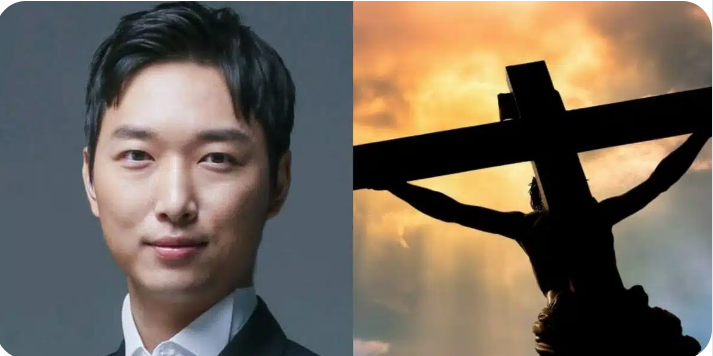
“I Believe Jesus Christ is God” — World’s Smartest Man Sparks Global Stir with Faith-Fueled Declaration

In an era where science and faith often appear to stand at odds, a surprising voice has emerged to challenge that narrative. Dr. YoungHoon Kim, the man officially recognized as having the highest IQ on Earth, has broken his silence on one of the most polarizing subjects in human history—religion. In a brief yet powerful statement posted on his official X (formerly Twitter) account, the Korean-born genius declared, “As the world’s highest IQ record holder, I believe that Jesus Christ is God, the way and the truth and the life.” With an IQ of 276, verified and endorsed by the Official World Record organization in 2024, Kim’s mind is one most scientists agree belongs in the rarest of rarified air. And now, that same mind is being directed toward matters of eternal consequence.
The post has sent shockwaves through both intellectual and spiritual communities alike. Not just because of what he said—but because of who said it. For many, it is the convergence of faith and intelligence, two forces long treated as incompatible. Dr. YoungHoon Kim’s statement is not only a personal profession of belief but also a cultural earthquake that has opened up a floodgate of reactions from across the globe. Some hailed his words as divine inspiration; others questioned the implications for his rational reputation.
The comment section under Kim’s original post quickly transformed into a battlefield of ideologies. A user identified as @chronicles_Curi responded emotionally: “The creator of all things, the redeemer, the savior of all mankind. He owes me nothing, but I owe him everything.” The tweet resonated with many who view faith not as a crutch for the ignorant but as a wellspring of strength for the spiritually awakened.
Others, however, saw the declaration through a more critical lens. @AdamBDeen, a self-identified Muslim, chimed in with respectful theological questioning: “As a Muslim, I am a believer of Jesus Christ, the Messiah, Son of Mary, as a Prophet of God... Please reference a verse in any version of the Bible where Jesus clearly and undisputedly referred to himself as ‘God’… I seek only respectful dialogue.” His comment highlighted the delicate balance between interfaith respect and doctrinal divergence.
Still, others leaned toward philosophical interpretations, like @ZenKen99, who challenged Kim’s assertion by pointing to a more universalist view of divinity: “Jesus said he was not ‘God’ but that you could go to ‘God’ yourself if you go within. He said ‘God’ is a power and that power was within everyone.” The sentiment echoes teachings from a variety of faith traditions that interpret divinity as intrinsic rather than external.
Despite the mix of praise and critique, one thing is clear: the world's smartest man has shattered a stereotype. In popular culture, the ultra-intelligent are often portrayed as agnostic, if not outright atheist. Figures like Stephen Hawking and Richard Dawkins have long dominated the public discourse on intelligence and religion with a skeptical tone. Kim’s open embrace of Christianity stands in bold contrast, signaling that the realms of faith and intellect are not necessarily mutually exclusive.
This is not the first time intelligence and spirituality have intersected controversially. Historical greats like Isaac Newton, Blaise Pascal, and even Albert Einstein have wrestled publicly with questions about the divine. But in the hyper-connected, hyper-skeptical digital age of 2025, a statement like Kim’s feels more revolutionary than ever. It’s not just a confession; it’s a challenge to the zeitgeist.
Religious groups across the globe are already rallying behind the proclamation. Church organizations have hailed Kim’s tweet as a “confirmation of divine wisdom.” Christian think tanks are preparing roundtables to explore the broader implications of his belief on the faith-intellect debate. Pastors are quoting him from the pulpit. And social media is ablaze with hashtags like #SmartestBeliever and #IQForChrist.
Yet with that attention comes scrutiny. Critics argue that intelligence doesn’t automatically validate religious belief. They caution against using Kim’s statement as a proof-point in theological debates. “Being smart doesn’t make you right about everything,” one post read. “Even geniuses can believe things that aren’t empirically provable.” And while that may be true, supporters counter that faith was never meant to be proven—it was meant to be believed.
Dr. YoungHoon Kim himself has not offered any further clarification since his initial post. No interviews. No follow-up tweets. No backtracking. Just one bold, definitive sentence that continues to echo across the digital landscape: “I believe that Jesus Christ is God, the way and the truth and the life.” For some, those words are a beacon. For others, a provocation. But for everyone paying attention, they are impossible to ignore.
What makes this moment especially compelling is its timing. In a world where polarization seems to be the norm, where faith is often dismissed in intellectual circles, and where public figures are cautious about controversial subjects, Kim’s declaration reads like a breath of fresh—and defiant—air. It’s not sponsored. It’s not part of a marketing campaign. It’s not designed to appease or provoke. It’s just one man’s conviction. But when that man happens to be the world’s smartest, that conviction hits differently.
There is, perhaps, a poetic irony to it all. That the man who has conquered the limits of mental measurement is now bowing to something immeasurable. That in a time of technological advancement and artificial intelligence, the world’s highest natural intellect points to a carpenter from Nazareth as the ultimate source of truth. And maybe, just maybe, that’s the most intelligent thing he could have ever done.


